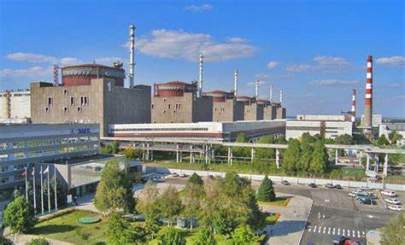UN nuclear watchdog says fighting near Ukraine power plant is 'intensifying'
Wednesday, March 29, 2023
Written by Julian Borger, World Affairs Editor, The Guardian
Categories: ASCF News

IAEA director general Rafael Grossi warns that hostilities around Zaporizhzhia risk ‘major nuclear accident which will spare no one’
The head of the UN nuclear watchdog, the International Atomic Energy Agency (IAEA), has made a second visit to the Zaporizhzhia nuclear plant in Ukraine amid an escalation in the fighting around it.
Rafael Mariano Grossi, the IAEA director general, was shown around the plant by Russian occupying forces and officials, telling reporters: “It is obvious that military activity is increasing in this whole region, so every possible measure and precautions should be taken so that the plant is not attacked.
“I think it’s no secret that there is a significant increase in the number of troops in the region, and there is open talk about offensive and counter offensives,” he added.
The plant is on the south bank of the Dnieper river, which forms the frontline at a time when Russian forces have attempted to conduct a series of offensives and Ukraine is widely expected to launch a counter-offensive in the coming months.
Grossi was accompanying three IAEA inspectors who will replace an outgoing monitoring team and are due to stay at the site for the next two months, the seventh team to take up the rotating role since the agency’s presence was accepted by Kyiv and Moscow.
The director general is also in Zaporizhzhia to continue efforts to negotiate protections for the plant, which would require the agreement of Ukrainian and Russian forces not to fire in or out of the area.
“There have been different concepts that we have been working on. Initially we were focusing on the possibility of the establishment of a well-determined zone around the plant. Now the concept is evolving and refocusing more on the protection itself and the things that should be avoided,” he said on Wednesday. “It is a work in progress.”
The negotiations have so far stalled on Russian refusal to withdraw its armed forces from the plant, a Ukrainian precondition for agreement. Grossi has repeatedly warned that a direct hit or a breakdown in safety systems could cause a catastrophe.
“What we need is to protect the nuclear power plant because if we don’t do that, there is a high risk of a major nuclear accident which is going to spare no one, Ukrainians or Russians,” Grossi told reporters on a visit to Washington earlier this month. He said that while he was trying to negotiate a protection zone, it would not try to attribute daily responsibility for the shelling.
“I’m still engaged in the effort, so you may understand that it wouldn’t be very wise for me to start saying who is to blame. It’s a process. It is a complex negotiation,” he said. “So this is why we avoid getting into apportioning blame because it will be a never ending story. What we need is an agreement, a solid political commitment, not to do this.”
“There is a quite obvious increase in the number of troops on both sides and military equipment,” he told the New York Times this week. “Our teams are also observing and hearing and seeing more military activity, including detonations, regular, almost permanent.”
Zaporizhzhia is the biggest nuclear power plant in Europe, but all six of its reactors have been shut down. Two of them are in “hot shutdown”, meaning they continue to give up a limited amount of energy to power safety and heating systems. It is however a difficult state to maintain, and the 3,000 remaining Ukrainian workers there, a quarter of the normal staff, are facing constant stress and exhaustion.
“Things continue but the situation is not sustainable,” Grossi said.
Read the full article here:




